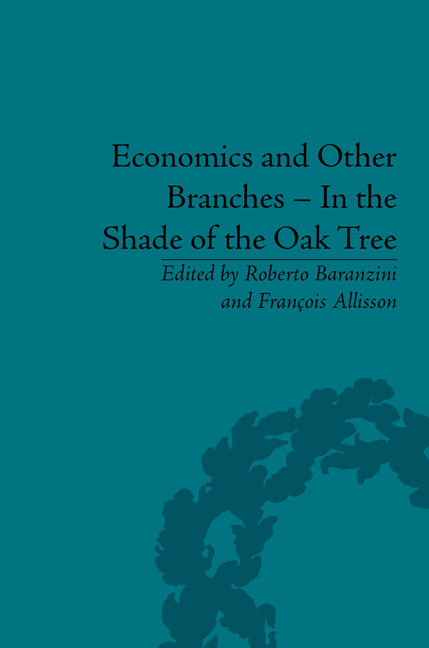Book contents
- Frontmatter
- CONTENTS
- List of Contributors
- List of Figures and Tables
- Introduction
- Pascal Bridel's Bibliography (up to 2013)
- Part I Léon Walras's Economic Thought
- Part II The Spreading of Thought
- Léon Walras's Reception
- The Lausanne School
- French Matters
- Cambridge UK
- Part III Monetary Theory
- Part IV Methodology
- 18 The Economics of Ethics and the Ethics of Economics in Adam Smith
- 19 Why do Economists and Philosophers Resort to the History of their Discipline?
- 20 Interest-Based Prediction and Mutual Expectations: Reflections on the Normative Value of Hobbesian Methodology
- 21 Tempests of the Business World: Weather Metaphors for Crises in the Nineteenth Century
- 22 Samuelson and the Non-Substitution Theorem: Some Methodological Remarks
- Part V Economics and Humanities
- Economics and Social Sciences
- Some Insights from Visual Arts
- Part VI Economics and Civil Society
- Notes
- Index
21 - Tempests of the Business World: Weather Metaphors for Crises in the Nineteenth Century
from Part IV - Methodology
- Frontmatter
- CONTENTS
- List of Contributors
- List of Figures and Tables
- Introduction
- Pascal Bridel's Bibliography (up to 2013)
- Part I Léon Walras's Economic Thought
- Part II The Spreading of Thought
- Léon Walras's Reception
- The Lausanne School
- French Matters
- Cambridge UK
- Part III Monetary Theory
- Part IV Methodology
- 18 The Economics of Ethics and the Ethics of Economics in Adam Smith
- 19 Why do Economists and Philosophers Resort to the History of their Discipline?
- 20 Interest-Based Prediction and Mutual Expectations: Reflections on the Normative Value of Hobbesian Methodology
- 21 Tempests of the Business World: Weather Metaphors for Crises in the Nineteenth Century
- 22 Samuelson and the Non-Substitution Theorem: Some Methodological Remarks
- Part V Economics and Humanities
- Economics and Social Sciences
- Some Insights from Visual Arts
- Part VI Economics and Civil Society
- Notes
- Index
Summary
This is a world of storms, and all of life's atmospheres are liable to be clouded by tempest – the commercial horizon, the political horizon, and the domestic horizon.
Introduction
Capitalistic crises, as distinct from the previous purely financial or agricultural crises, started to become a theoretical problem early in the nineteenth century. Their occurrence, and then recurrence, raised the question why the accumulation of capital and the flow of exchanges were on occasion abruptly interrupted. The problem was perceived to be an eminently practical one, as the ultimate aim of the quest was finding a remedy; in the mechanical approach prevalent at the time, the solution required the removal of the cause (or causes), and therefore their preliminary identification. The literature is immense, but mostly in the form of pamphlets and other topical contributions often published immediately after each crisis, written by bankers, merchants, politicians and occasionally operatives, only rarely by theorists. The style was often loose, teeming with rhetoric (their purpose was, after all, to convince the addressee) and often made use of metaphors.
In these debates on a phenomenon that was slowly taking shape before the witnesses' eyes, and for which there was scarcely a theoretical foundation, concepts and interpretations emerged as the discussion unfolded. In a discipline so much in the making, metaphors were often used not much to embellish the text, but as an aid to discovery and/or as a means for communicating ideas.
- Type
- Chapter
- Information
- Economics and Other Branches – In the Shade of the Oak TreeEssays in Honour of Pascal Bridel, pp. 291 - 308Publisher: Pickering & ChattoFirst published in: 2014



